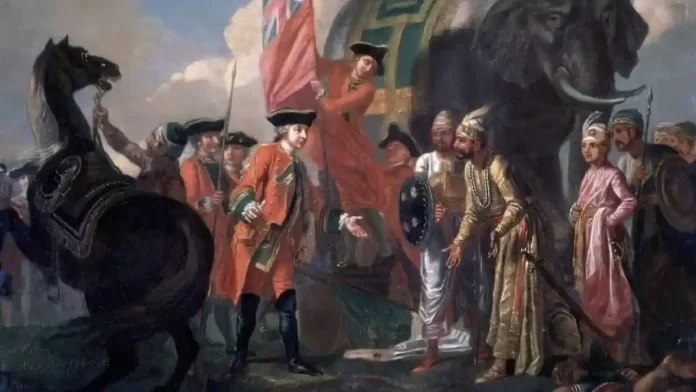Lord Clive was a prominent figure in British history, known for his military conquests and political influence during the 18th century.
He fought the Battle of Plassey against Nawab Siraj-ud-Daula in 1757 and was instrumental in establishing British rule in India. He also played a crucial role in the British East India Company’s expansion in the subcontinent.
However, his life was also marked by controversy and scandal, with accusations of corruption and abuse of power. Lord Clive’s death in 1774 was sudden and tragic, shrouded in mystery and speculation.
In this article, we will delve into Lord Clive’s life and legacy, and examine the circumstances surrounding his death.
Lord Clive and the Battle of Plassey
The battle of Plassey is considered to be a watershed moment in Indian history as it opened the floodgates of the British conquest of the Sub-Continent.
Though the battle was decisive in terms of its implications for the future of the sub-continent, there was no glory or bravery on part of British forces under Lord Clive.
It is so because they won the battle of Plassey not on the basis of their strength and bravery but by treachery and mischief.
To dethrone the Nawab of Bengal, they forged secret alliances with the traitors of Bengal namely Mir Zafar, Omichand, Rai Durlabh, and Jagat Seth- a powerful banker of Bengal.
In this manner, the fate of the battle was already decided before it even began.
Once the battle was won, the British comfortably became the king-makers of Bengal and soon started virtually controlling the vast trade and commerce of Bengal which in turn solidified their military prowess in the rest of the subcontinent.
Bengal and Lord Clive
Having won the battle of Plassey, Lord Clive installed Mir Jafar as the new Nawab of Bengal. But the British did not bestow any real power on Jafar.
While the British oversaw the revenue collection, the Nawab was responsible for the maintenance of law and order. In other words, a sort of dual administrative system was imposed in Bengal.
This led to a huge administrative failure and law and order issues. As expected, it later gave the British a good justification for taking complete control of Bengal.
And after the battle of Buxar in 1764, Clive extended the frontiers of the East India Company’s rule further to Allahabad and Kara.
From the weak Mughal Emperor Shah Alam, Lord Clive also bargained for the right of duty-free trade and preferential treatment for the company in some other Mughal provinces besides Bengal.
However, Clive’s policies proved disastrous for civilians living under British rule as they were gradually robbed of their wealth and honor while company merchants and officials were busy filling their coffers by draining the great Indian wealth and taking back its riches to Britain.
Lord Clive’s regressive and exploitative tax policies are also blamed for the great Bengal famine between 1769 and 1773, which reduced the population of Bengal by a third.
Trial of Lord Clive
As a reward for establishing British Supremacy in India, Robert Clive was once again appointed as the Governor of Bengal in 1765.
However, when he returned this time to England in 1769, he was put on trial on allegations of misappropriation of huge wealth and financial frauds during his stay and campaigns in India.
The inquiry was finally held in 1772 in response to public criticism of Clive’s actions in India, which were seen as unethical and corrupt.
The inquiry resulted in Clive’s resignation from public office, but he was eventually cleared of any wrongdoing and was granted a substantial financial settlement by the British government.
Clive not only got himself completely exonerated for his alleged crimes but also got himself commended for the “great and meritorious service” he had rendered to Great Britain.
Despite the controversy surrounding his actions, Clive is widely regarded as a hero in Britain for his role in establishing the British presence in India and expanding the empire.
Lord Clive’s Death by Suicide
However, within a few years of this incident, Lord Clive died mysteriously on 22 November 1774 at the age of 49. It was later ruled as a death by suicide.
The reasons behind his suicide remained unclear. Some alleged that he had stabbed himself or had cut his throat with a penknife.
Others whispered that he had taken an overdose of Opium- the same drug with which the British had infected and robbed China and the East.
While many Britishers continue to regard Clive with much honor and admiration, for many others, like William Dalrymple, he remains an “unstable sociopath” whose atrocious policies caused widespread poverty, death, and famines in Bengal.
So this was the fate of Lord Robert Baron Clive (the forerunner of the British Empire in India according to Percival Spear) in this world and God knows best about the hereafter.
Someone has rightly said- “As you sow, so shall you reap.”
They plan and plot and Allah also plans. Surely, Allah is the best of planners.
Holy Quran 8:30
And every soul will be paid in full for what it has done, and they will not be wronged.
Holy Quran 16:111
If you work righteousness, you work righteousness for yourselves; and if you commit evil, you do so against yourselves.
Holy Quran 17:7
